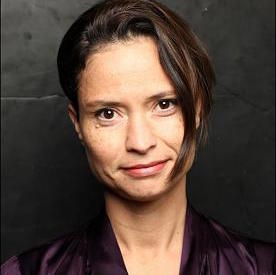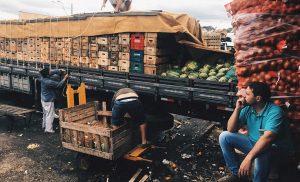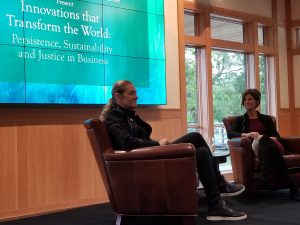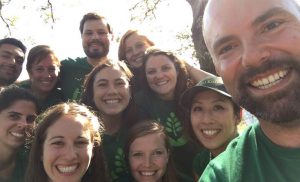This post was written by Sarah Healey ’18.
 Marilia Bezerra spoke recently to The Sustainable Innovation MBA cohort as the third Innovator in Residence for the year. She is the Managing Partner at CARE Enterprises, CARE’s social enterprise venture that links producers in the world’s poorest communities with the formal markets necessary for those producers to sell their products and services. It focuses on business ventures with the potential for exponential growth and to become game-changers in the fight against poverty.
Marilia Bezerra spoke recently to The Sustainable Innovation MBA cohort as the third Innovator in Residence for the year. She is the Managing Partner at CARE Enterprises, CARE’s social enterprise venture that links producers in the world’s poorest communities with the formal markets necessary for those producers to sell their products and services. It focuses on business ventures with the potential for exponential growth and to become game-changers in the fight against poverty.
Marilia’s life has led her on a career path full of sharp turns and road blocks that created her story.
In telling her story she offered nine lessons and pieces of advice to
aspiring entrepreneurs:
Nine Lessions…
- Figure out how to become the connective tissue for the problems we need to solve. A fundamental ingredient for all of us stepping into the world is to figure out how to connect people to each other to solve problems.
- Telling your story can be limiting.
- Be keenly aware of your privilege –- Bezerra talked about how she won the privilege lottery. She grew up during a relatively stable time in Brazil and was raised in a middle-class family that afforded her opportunities in life, but gave her a sense of value of the most basic things.
- If you are going to say something, know what it means. When using metrics, many of the numbers mean nothing. For example, the calculation of how many lives a program touched. What Bezerra learned was to ask yourself what it means three time when stating metrics and figures. If at any point you cannot answer, then the metric likely does not have meaning.
- Sometimes you will need to take sharp turns to figure out what you are doing, and you need to just go for it! Life takes weird turns, close your eyes and say, ‘Mom & Dad, I got this.’
- Fundraising is like running a marathon — it is going to be uncomfortable, but you just keep running through it until it gets better.
- How you feel now is not going to last — Bezerra talked about the importance of needing to detach yourself from your story for a point in time. This powerful mechanism allows you to step outside and detach from life to get past the disruption.
- Take time off & really take it! –- it is tempting to think about what is next, but Bezerra talked about the importance of taking a real break when you are burnt out.
- After doing cool things, the expectation of what is next can be limiting. When you are taking a break and looking for the next steps, people will ask what is next, but do not let that limit your story.
…And One Question
Bezerra finished with a question for aspiring entrepreneurs: How are you going to get really good at working at the edge of chaos?

 This article was written by
This article was written by 
 During a break from undergraduate studies, Rothblatt was inspired by traveling and working with a NASA satellite station. She wondered if it would be possible to have something in the Earth’s orbit that could give music to the world. Feeling enthused, she returned to school to study communication. She continued onto grad school and graduated from UCLA with JD-MBA degree. All the while, Rothblatt’s passion for satellite communication continued to remain at the forefront of her life, leading her to become founder and CEO of
During a break from undergraduate studies, Rothblatt was inspired by traveling and working with a NASA satellite station. She wondered if it would be possible to have something in the Earth’s orbit that could give music to the world. Feeling enthused, she returned to school to study communication. She continued onto grad school and graduated from UCLA with JD-MBA degree. All the while, Rothblatt’s passion for satellite communication continued to remain at the forefront of her life, leading her to become founder and CEO of  Originally from Hinesburg, Vermont, Caitlin left to pursue an undergraduate degree at Dickinson College in Pennsylvania and later moved to Boston where she worked at Bain & Company, a top global management consulting company. At Bain & Company, Caitlin worked on analysis and employee engagement as part of the firm’s global human capital team to attract, engage and retain employees. Her success at Bain & Company enabled her to live in Shanghai for several years.
Originally from Hinesburg, Vermont, Caitlin left to pursue an undergraduate degree at Dickinson College in Pennsylvania and later moved to Boston where she worked at Bain & Company, a top global management consulting company. At Bain & Company, Caitlin worked on analysis and employee engagement as part of the firm’s global human capital team to attract, engage and retain employees. Her success at Bain & Company enabled her to live in Shanghai for several years. However, he faced a number of issues in executing the Cape Wind vision. First, Gordon immediately ran into extreme and well-funded opposition from rich property owners along the coast who did not want to see their ocean view marred by wind turbines. People from the Koch Brothers to Bunny Mellon to Walter Cronkite joined forces behind the Alliance to Protect Nantucket Sound (APNS): a NIMBY (not-in-my-backyard) group flush with cash and influence who set out to discredit Gordon and undercut the validity of the Cape Wind project. Second, Cape Wind faced prominent political opposition. The influence and connections of the APNS board members wreaked havoc for Cape Wind’s political standing and extensive lobbying efforts damaged the progress of what would have otherwise been a highly embraced endeavor. Finally, Cape Wind was an expensive undertaking – one whose fluctuations in cost had significant impact on its timeline.
However, he faced a number of issues in executing the Cape Wind vision. First, Gordon immediately ran into extreme and well-funded opposition from rich property owners along the coast who did not want to see their ocean view marred by wind turbines. People from the Koch Brothers to Bunny Mellon to Walter Cronkite joined forces behind the Alliance to Protect Nantucket Sound (APNS): a NIMBY (not-in-my-backyard) group flush with cash and influence who set out to discredit Gordon and undercut the validity of the Cape Wind project. Second, Cape Wind faced prominent political opposition. The influence and connections of the APNS board members wreaked havoc for Cape Wind’s political standing and extensive lobbying efforts damaged the progress of what would have otherwise been a highly embraced endeavor. Finally, Cape Wind was an expensive undertaking – one whose fluctuations in cost had significant impact on its timeline.



 I was MBA-bound for a while. I took the GMAT once and was exploring future options for MBA programs. I did lots of research on two-year programs, which I liked. I was going to push the application process out a year to continue studying for the GMAT, but instead I applied to The Sustainable Innovation MBA. I liked that the opportunity cost of attending The Sustainable Innovation MBA program was only one year and offered me a great change of network, too, away from my primary one in D.C.
I was MBA-bound for a while. I took the GMAT once and was exploring future options for MBA programs. I did lots of research on two-year programs, which I liked. I was going to push the application process out a year to continue studying for the GMAT, but instead I applied to The Sustainable Innovation MBA. I liked that the opportunity cost of attending The Sustainable Innovation MBA program was only one year and offered me a great change of network, too, away from my primary one in D.C.